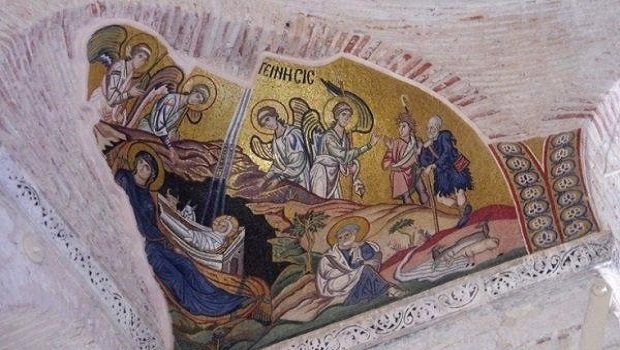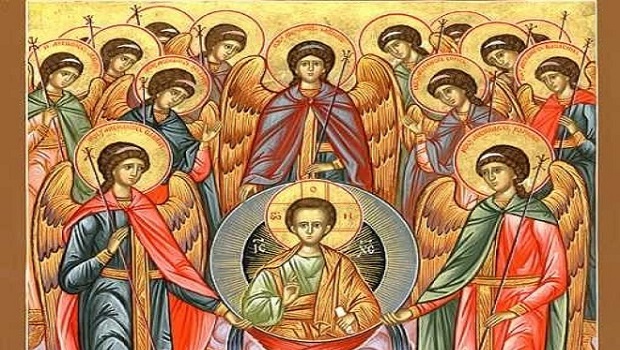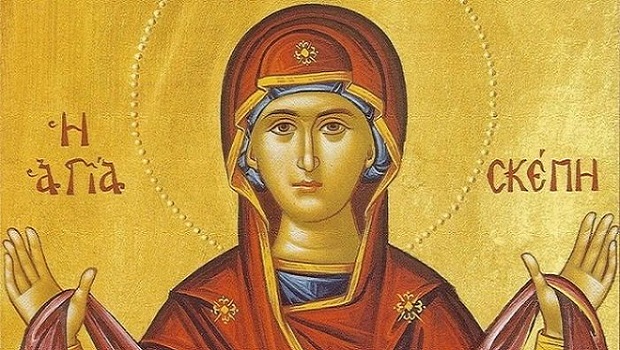Archimandrite Zacharias Zacharou
‘God is gone up with a shout, the Lord with the sound of a trumpet.’[1]
The Ascension is the last event in Christ’s earthly life. Of course, Pentecost is the fulfilment of God’s dispensation, which is why is called ‘the last feast’[2]. God the Father was well pleased to see man as he had conceived him before the foundation of the world and sent the Holy Spirit to the world to seal man’s reconciliation with God. In the person of Jesus Christ, God received all mankind, the ‘middle wall of partition’[3] broke down and all divergences converged. This feast’s magnificent splendour rests in the fact that when Christ ascends to heaven, when Christ ascends to heaven, He lifts up to the throne of God’s glory this spotless and undefiled human nature which was bestowed upon Him by the Holy Virgin and in which the incomprehensible love of the Father without beginning was also revealed.
Christ ‘descended first into the lower parts of the earth, then ascended up on high, led captivity captive, and gave gifts unto men.’[4] The gifts of the Holy Spirit irrigated the earth like ‘gentle rain’. Thus the promise of the Lord was fulfilled that rivers of living water would flow from the heart of all of those who believed in His Name[5].
During the period that followed the Resurrection, the Lord continually appeared to His disciples and initiated them into the mysteries of His Kingdom. The forty days after Easter were an intensive theological course. In His discourse with them, Christ answered the Apostles’ perplexities, opened their mind to understand the Scriptures, set their hearts alight with longing for His Kingdom and resolved all their problems. The Apostles remained ‘with one accord'[6] ‘continuing steadfastly in fellowship, and in breaking of bread, and in prayers’[7]. They lived with such intense prayer in the presence of their Risen Teacher, that His words were marked in their heart and memory, just as when man seeks a word from God and His saints with extreme tension in prayer and concentration.
For forty days, the Lord was seen by the disciples[8] and instructed them. The disciples had known Him in the flesh, soon they would know Him in the Spirit[9]. For the three years that they had followed Him, they had seen Him, heard Him, touched Him[10]. However, the flesh no longer profited them anything[11]. Now they had to know Him as the Lord of Sabbaoth, and to love and worship Him ‘in Spirit and truth’[12].
During this period, the Lord delivered new lessons to them; He taught them on the one hand through His Presence, so as to be able to comprehend the entire theory of His Person, as it was foretold by the Prophets, revealed on earth through His Incarnation and presented as a new reality after the Resurrection. On the other hand, He also gave them the instruction of His absence. Despite His promise, He allowed His disciples to feel orphaned, every time that He disappeared from before their eyes, and especially the ten days between the Ascension and the coming of the Holy Spirit, so as to intensify their longing and thirst.
The Church Fathers relate that the Lord did not ascend like lightning, but slowly. Christ went up gradually to heaven, in order to sanctify the ether, as He sanctified all the earth through His presence, all the waters through His Baptism in the Jordan, and the nethermost parts of the earth by remaining ‘in the belly of hell’ for three days. The ether is full of evil spirits, so it needed to be sanctified by the Lord to smooth our passage from earth to heaven at the hour of our death. Thus we have the chance to make the journey without temptation and invulnerable to the demon’s evildoing.
While the Lord ascended and the disciples watched Him depart in wonder, two angels appeared in white garments and said: ‘Ye men of Galilee, why stand ye gazing up into heaven?’[13] Of course, these citizens of heaven were not puzzled that the disciples were gazing upwards, for at such a moment their gaze could not have been cast down, but their words concealed a subtle admonition because they found the disciples caught in a state of inertia. Raising the gaze towards heaven is not enough, if it is not accompanied by a burning heart. For joy and inspiration overflow as a surging torrent when the life of man ‘is hidden with Christ in God’[14]. By their words, the angels reminded the disciples about the Second Coming and intensified their expectation. God sent His angels to bestow an eschatological dimension upon the apostles’ thoughts, to explain that as He ascended, so, in the same way He will come again, so their hearts will remain full of peace, and the ineffable, incorruptible consolation of His Spirit.
In the event of the Ascension we observe three further important points. The first is that the Lord ascended, while He blessed. His blessing is the grace of heaven, that comes ‘as the dew of Hermon, and as the dew that descended upon the mountains of Zion’[15]. He departed from His chosen disciples, in the same way that He will come on the day of the Last Judgment. The blessing of the Lord rested on the apostles and through them was extended ‘upon all flesh’[16] and it remains as a precious inheritance within His Church imparted to all her members through her bishops and priests, until it reaches perfection at the Second Coming.
God formed the world out of love and never ceased to take care of man even in his rebellion. He bestowed duration upon man out of His lovingkindness, so it might be a time of repentance and redemption, sealing all this life with the sign of His blessing. This seal marks him out as chosen so the angels may recognise him on the day of the Second Coming. The fact that He ascended ‘while blessing them’ begets a great hope that on that awesome Day, His judgement will be mingled with His love and mercy.
A second characteristic of the Ascension is the glorious way in which He went up. From beginning to end, Holy Scripture speaks about the glory of God, which is often described as a luminous cloud. In the Old Testament they saw this glory, but not the Lord. In the New Testament, when the Lord came in the flesh, He concealed His glory within ‘our lowly body ‘[17], so as to not to terrify His fallen creature by appearing unshielded. Men saw the humble, meek Lord as a ‘lamb led to the slaughter’[18], but they were not able to discern His glory, which is the reason that many did not recognise Him as the Messiah. However, those with a good disposition believed and received the grace to be regenerated. Those who accepted His word and believed in His Name, received the power to be called children of God[19] and ‘passed from death unto life’[20].
Now, at the end of His earthly life, Christ appears openly as the Son of God manifest in His glory. On the day of His glorious Appearing, the Lord will come again ‘in the clouds of heaven with power and great glory’[21]. The Ascension is thus a prophetic event, and the Lord Himself becomes a Prophet of His Second Coming.
His glory, which will be like lightning during that eminent Day, will protect those who bear the seal of His blessing from any spirit of delusion spread by the pseudo-prophets that preach in each era: ‘Lo, here is Christ; or, lo, he is there’ so as ‘to seduce, if it were possible, even the elect’[22]. In other words, the Lord warned them not to pay attention to alien, false voices that would exhort them to cut themselves off from the Church and go astray like those who have their gaze stuck to the earth and their heart weighed down with the cares of this world. By contrast, those who have their gaze raised high and ‘set their affection on things above’[23], will not become deluded but will await with great endurance the true sign of the Lord’s presence.
The Lord did not pass down His words secretly: ‘What I tell you in darkness, that speak ye in light: and what ye hear in the ear, that preach ye upon the housetops’[24]. Thus also His presence will not have anything secret or hidden about it. ‘For as the lightning cometh out of the east, and shineth even unto the west; so shall also the coming of the Son of man be.’[25] Holy Scripture gives adequate information about the event of the Lord’s glorious coming at the ends of the ages, so that when He comes to judge the living and the dead, the faithful will be able on the one hand to recognise it and not live in darkness, but also not to lose heart in the afflictions and suffering that will occur ‘for their redemption draweth nigh’[26].
The coming of the Lord will be encompassed by glory and for us the most glorious way to expect Him is to await Him in Jerusalem, that is, as active and committed members within His Church and her Mysteries, attributing to Him praise and thanksgiving.
The third characteristic that we observe in the Ascension is the suddenness and unexpectedness of the event. The Second Coming will also be sudden and unexpected. On many occasions, the Lord warned us: ‘Take ye heed, watch and pray: for ye know not when the time is…And what I say unto you I say unto all, Watch.’[27] Confidence in salvation cannot be based on human calculations. The Apostle Peter exhorts us: ‘Wherefore seeing that ye look for such things, be diligent that ye may be found of him in peace, without spot, and blameless’[28]. Thus the only thing that we can do is offer continual repentance to God and a contrite heart, so as to taste before the end the peace of reconciliation and to transform the time of our life on earth into the time of the Lord’s goodness.
All the life of the faithful courses with the expectation of the Bridegroom, however, it is well known in spiritual life that those with a pseudo-apocalyptic, spurious and vain attitude of expectancy, who look for apparitions and visions, bear an arrogant spirit and easily become pray to the enemy’s delusion. Often, those who deserve to be snatched up in spirit within the eternity of God are those who are immersed in mourning and in humble prayer, considering themselves dust and ashes, ‘unworthy of life and worthy of every kind of hell,’[29] but never ceasing to invoke His mercy ‘hoping against hope’[30]. Even when they are illumined all around by the Light that knows no eventide, their repentance is inexorable.
It avails nothing to search out times and seasons, but it is essential to continually search out our heart, to purify it and not allow anything foreign to enter into this place which above all belongs to God. If we do this, we will be vouchsafed to stand and meet the humble and meek gaze of the Almighty Jesus. The Day of the Lord must come as a surprise, because in this way our heart will be tried as in a furnace.
The true eschatological expectation protects us from the gloomy sleep of despondency, that infests the children of this age and clouds the mind. At the same time, it transforms this transient life into the fervent anticipation of the incorruptible and unshakeable; obliterating the temptation to deny the Final Judgement with the thought: ‘Where is the promise of his coming? for since the fathers fell asleep, all things continue as they were from the beginning of the creation.’[31]
The longing for the coming of the Lord lends our life a spirit of ‘mad love’, as the Fathers say, that overcomes every other yearning and false desire of this world that passes away[32]. ‘One thing is needful’[33] the grace of Heaven, the flame of the Comforter, that will indelibly seal us so that the Lord may know us as His own on that Day, when He comes to take everyone to abide with Him unto all ages.
Source: pemptousia.com




0 Comments